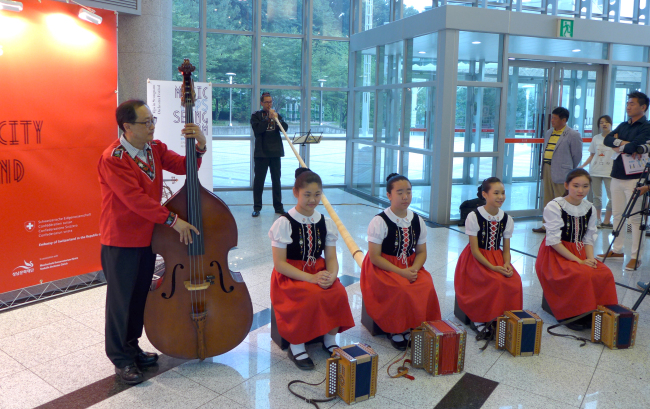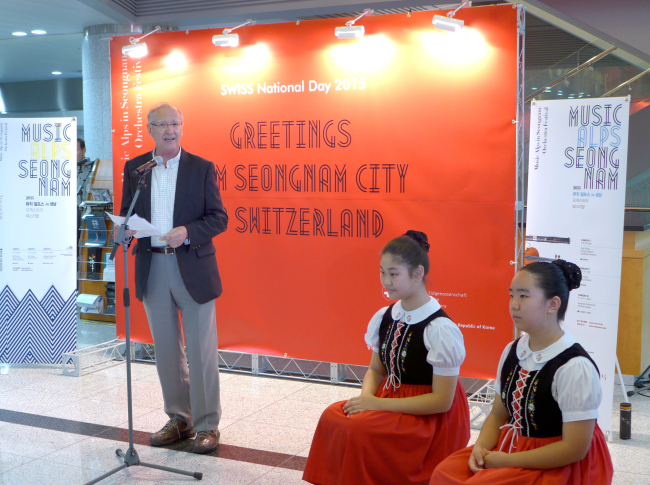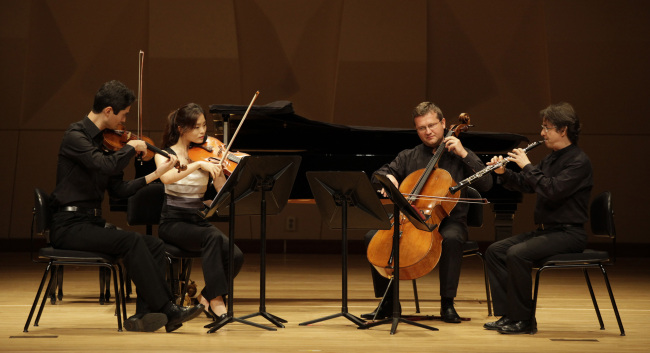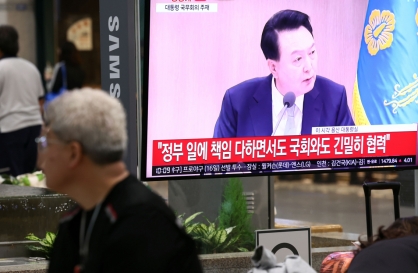Switzerland marks national day with classical music
By Korea HeraldPublished : Aug. 9, 2015 - 18:28
The Swiss embassy celebrated the country’s national day event with classical and traditional music that struck a chord of harmony among the participants.
The Music Alps in Seongnam, a music festival born of a partnership between Zurich and the city of Seongnam, Gyeonggi Province, kicked off on Aug. 1 for two weeks at Seongnam Arts Center, coinciding with the Swiss National Day.
The Music Alps in Seongnam, a music festival born of a partnership between Zurich and the city of Seongnam, Gyeonggi Province, kicked off on Aug. 1 for two weeks at Seongnam Arts Center, coinciding with the Swiss National Day.

As an exchange program between the two cities, the venue provides opportunities for participating youths to produce and perform music with professional musicians. This year, 116 Korean middle school, high school and university students and five Swiss students have teamed up with members of the Tonhalle Orchestra Zurich and the Conservatory of Music Zurich here, and the Korean side will visit Switzerland next year.
Christian Vasquez, the chief conductor of the Stavanger Symphony Orchestra, will conduct the finale concert on Aug. 14 at 7:30 p.m., which will feature the music of Saint-Saens and Dvorak. The concert at 3 p.m. on the same day will feature compositions by John Williams, Lalo Schifrin, Patrick Doyle, Klaus Badelt, Monty Norman, Mozart and Vivaldi.
“Switzerland is celebrating 724 years of nationhood since it was founded in 1291. The holiday is an important celebration of Swiss communities all around the world,” Swiss Ambassador Jorg Al. Reding told The Korea Herald at the center on Aug. 1.

The ambassador noted Switzerland’s strong musical tradition harnessed by world-class symphonic orchestras and yodel ensembles. Symphonies from Zurich, Geneva, Basel and Lugano have visited Korea the last two years, and many Korean musicians are living in Switzerland and performing in Swiss orchestras, he said.
At the reception, which was attended by 50 Swiss nationals living in Korea, yodel group Korea Alpenrose Oergeli Kapelle sang scores of Swiss folk songs accompanied by a bass and Swiss traditional instruments alphorn and oergeli.
“When Swiss politicians come to Korea and listen to their music, they get so emotional that their eyes well up with tears,” Reding highlighted. “Koreans are emotional, but Swiss are also emotional when it comes to music.”

The group is the third generation of children who yodel in Korea, after Korean yodel-singer Kim Hong-chul, 68, brought the music here in the late 1960s.
Reding, an ambassador to Korea for three years, said he aimed to deepen science and innovation cooperation with Korean companies, universities and research centers.
Since Korean President Park Geun-hye visited Switzerland in January last year, the two countries have developed close cooperation in tourism, vocational education, and scientific research and development, according to the ambassador.
In early August 1291, Switzerland’s three alpine cantons swore the oath of confederation through the Federal Charter ― Pacte du Grutli ― leading to the beginnings of a nation.
Aug. 1 has been celebrated as the founding date of the Swiss Confederacy since 1889, but it became an official public holiday in 1994. The holiday is marked by street parades with paper lanterns, fireworks, bonfires, national flags and rifle shootings in Switzerland.
The Alpine nation, where German, French, Italian and Romansh are spoken officially, is a federal multiparty directorial republic with elements of direct democracy. A directorial republic is a country governed by a college of leaders that jointly exercise the powers of a head of state or government, in contrast with the presidential republic and parliamentary republic.
In a state of the nation address on Aug. 1, Swiss President Simonetta Sommaruga urged Swiss citizens around the world to exercise their rights and responsibilities by voting in the federal elections in October through the embassies.
“Our direct democracy is a unique and courageous political system that we all identify with. Our citizens have the most political power and responsibility in the world,” the Swiss leader said. “In a small country like ours, every vote really does count. The majority of cantons will be offering electronic voting for expatriates.”
By Joel Lee (joel@heraldcorp.com)
-
Articles by Korea Herald







![[From the Scene] Monks, Buddhists hail return of remains of Buddhas](http://res.heraldm.com/phpwas/restmb_idxmake.php?idx=644&simg=/content/image/2024/04/19/20240419050617_0.jpg&u=20240419175937)







![[From the Scene] Monks, Buddhists hail return of remains of Buddhas](http://res.heraldm.com/phpwas/restmb_idxmake.php?idx=652&simg=/content/image/2024/04/19/20240419050617_0.jpg&u=20240419175937)

![[KH Explains] Hyundai's full hybrid edge to pay off amid slow transition to pure EVs](http://res.heraldm.com/phpwas/restmb_idxmake.php?idx=652&simg=/content/image/2024/04/18/20240418050645_0.jpg&u=20240419100350)

![[Today’s K-pop] Illit drops debut single remix](http://res.heraldm.com/phpwas/restmb_idxmake.php?idx=642&simg=/content/image/2024/04/19/20240419050612_0.jpg&u=)